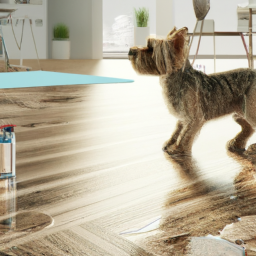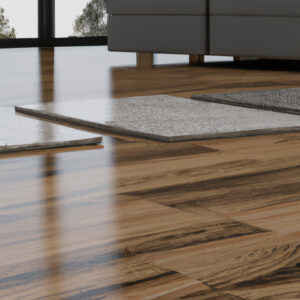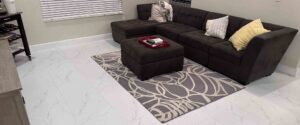What is waterproof flooring?
Waterproof flooring is a type of flooring that is designed to resist water damage, making it ideal for areas prone to moisture, spills, or flooding.
What is water-resistant flooring?
Water-resistant flooring is a type of flooring that is designed to resist water to some degree, but is not completely waterproof.
What is laminate flooring?
Laminate flooring is a type of flooring made from layers of compressed fiberboard and a printed image of the desired surface, typically designed to mimic the appearance of wood or stone.
What is tile flooring?
Tile flooring is a type of flooring made from materials like ceramic, porcelain, or natural stone, typically installed in a pattern or design and known for its durability and resistance to moisture.
What are the benefits of waterproof flooring?
Waterproof flooring is highly resistant to water damage, making it a good choice for areas like bathrooms, kitchens, and basements.
It can be easy to clean and maintain, and can help prevent the growth of mold or mildew.
Some types of waterproof flooring, such as luxury vinyl planks, can mimic the look of natural materials like wood or stone at a lower cost.
What are the benefits of water-resistant flooring?
Water-resistant flooring can provide some protection against water damage, making it a good choice for areas with occasional spills or moisture, like entryways or laundry rooms.
It can also be easy to clean and maintain, and may be more affordable than waterproof flooring options.
What are the benefits of laminate flooring?
Laminate flooring can provide a realistic and durable alternative to natural materials like hardwood or stone.
It is typically more affordable than these materials, and can be easy to install and maintain.
Some types of laminate flooring are also water-resistant, making them suitable for areas like kitchens or dining rooms.
What are the benefits of tile flooring?
Tile flooring is highly durable and resistant to water, making it a good choice for high-traffic areas or areas prone to moisture, like bathrooms or kitchens.
It can come in a variety of colors, patterns, and textures, allowing for a wide range of design options.
Tile flooring can also be easy to clean and maintain, and can help keep indoor air quality high by resisting the growth of mold or allergens.
Can waterproof flooring be installed in any room?
Yes, waterproof flooring can be installed in any room, including bathrooms, kitchens, basements, and laundry rooms.
Can water-resistant flooring be installed in any room?
Water-resistant flooring can be installed in most rooms, but may not be suitable for areas with high levels of moisture or standing water, like bathrooms or basements.
What are the different types of waterproof flooring?
The different types of waterproof flooring include luxury vinyl plank (LVP), luxury vinyl tile (LVT), WPC (wood-plastic composite), SPC (stone-plastic composite), and ceramic or porcelain tile.
What are the different types of water-resistant flooring?
The different types of water-resistant flooring include laminate flooring, vinyl flooring, and engineered hardwood flooring.
Can laminate flooring be installed in moisture-prone areas?
While some types of laminate flooring are water-resistant, they are not completely waterproof and may not be suitable for areas prone to standing water or high levels of moisture.ç
Can tile flooring be installed over existing flooring?
Tile flooring can often be installed over existing flooring, but it depends on the condition of the existing floor and the type of tile being installed. It’s best to consult with a professional installer for guidance.
What is the lifespan of waterproof flooring?
The lifespan of waterproof flooring varies depending on the type and quality of the flooring, as well as the amount of foot traffic and wear and tear it receives. On average, waterproof flooring can last anywhere from 10-25 years.
What is the lifespan of water-resistant flooring?
The lifespan of water-resistant flooring also varies depending on the type and quality of the flooring, as well as the amount of foot traffic and wear and tear it receives. On average, water-resistant flooring can last anywhere from 10-20 years.
Is waterproof flooring more expensive than other types of flooring?
Waterproof flooring can be more expensive than other types of flooring, but it depends on the specific product and brand. However, it can be a worthwhile investment in areas prone to moisture or water damage.
Is tile flooring difficult to maintain?
Tile flooring can be easy to maintain with regular sweeping and mopping, and can resist stains and spills if properly sealed. However, the grout lines between tiles may require occasional deep cleaning to prevent discoloration or mold growth.
What is the best flooring option for a bathroom?
The best flooring options for a bathroom are typically waterproof or water-resistant, such as ceramic or porcelain tile, luxury vinyl tile, or sheet vinyl.
What is the best flooring option for a kitchen?
The best flooring options for a kitchen are typically waterproof or water-resistant, easy to clean, and durable, such as ceramic or porcelain tile, luxury vinyl plank, or laminate flooring.
| Question | Answer |
|---|---|
| What is waterproof flooring? | Waterproof flooring is flooring that is completely impervious to water and can be submerged without being damaged. |
| What is water-resistant flooring? | Water-resistant flooring is flooring that can resist water to some degree, but is not completely impervious to water and can be damaged by prolonged exposure. |
| What is laminate flooring? | Laminate flooring is a type of flooring that is made of multiple layers of synthetic materials that are fused together with heat and pressure to create a durable and inexpensive flooring option. |
| What is tile flooring? | Tile flooring is a type of flooring made of hard, durable materials such as ceramic, porcelain, or stone that are laid in a pattern and grouted together to create a durable and decorative surface. |
| Is waterproof flooring the same as water-resistant flooring? | No, waterproof flooring is completely impervious to water and can be submerged without damage, while water-resistant flooring can resist water to some degree but is not completely impervious and can be damaged by prolonged exposure. |
| What are the advantages of waterproof flooring? | The advantages of waterproof flooring include its durability, resistance to moisture and spills, and ease of maintenance. |
| What are the advantages of water-resistant flooring? | The advantages of water-resistant flooring include its affordability, versatility, and resistance to minor spills and moisture. |
| What are the disadvantages of laminate flooring? | The disadvantages of laminate flooring include its susceptibility to moisture damage, difficulty in repair, and inability to be refinished. |
| What are the disadvantages of tile flooring? | The disadvantages of tile flooring include its hardness, which can be uncomfortable to stand on for long periods, and its susceptibility to cracking or chipping if heavy objects are dropped on it. |
| What are the maintenance requirements for waterproof flooring? | Waterproof flooring typically requires minimal maintenance, with regular sweeping or vacuuming and occasional mopping with a mild cleaner. |
| What are the maintenance requirements for water-resistant flooring? | Water-resistant flooring typically requires regular sweeping or vacuuming and occasional mopping with a mild cleaner, and may also require periodic resealing or other maintenance to protect against water damage. |
| What are the maintenance requirements for laminate flooring? | Laminate flooring requires regular sweeping or vacuuming and occasional mopping with a mild cleaner, but should be kept dry and not subjected to standing water or excessive moisture. |
| What are the maintenance requirements for tile flooring? | Tile flooring requires regular sweeping or vacuuming and occasional mopping with a mild cleaner, but may require more intensive cleaning and resealing to remove stains or protect against water damage. |
| Can waterproof flooring be installed in any room? | Yes, waterproof flooring can be installed in any room, including bathrooms, kitchens, basements, and laundry rooms. |
| Can water-resistant flooring be installed in any room? | Water-resistant flooring can be installed in most rooms, but may not be suitable for areas with high levels of moisture or standing water. |
| Can laminate flooring be installed in any room? | Laminate flooring can be installed in most rooms, but should not be installed in areas with high levels of moisture or standing water, such as bathrooms or laundry rooms. |
| Can tile flooring be installed in any room? | Tile flooring can be installed in most rooms, but may not be suitable for areas with uneven subfloors or high levels of foot traffic. |
| What is the lifespan of waterproof flooring? | The lifespan of waterproof flooring varies depending on the quality of the materials and installation, but can last up to 25 years or more with proper maintenance. |
| What is the lifespan of water-resistant flooring? | The lifespan of water-resistant flooring varies depending on the quality of the materials and installation, but can last up to 20 years or more with proper maintenance. |
| What is the lifespan of laminate flooring? | The lifespan of laminate flooring varies depending on the quality of the materials and installation, but can last up to 20 years or more with proper maintenance. |
| What is the lifespan of tile flooring? | The lifespan of tile flooring varies depending on the quality of the materials and installation, but can last up to 50 years or more with proper maintenance. |





